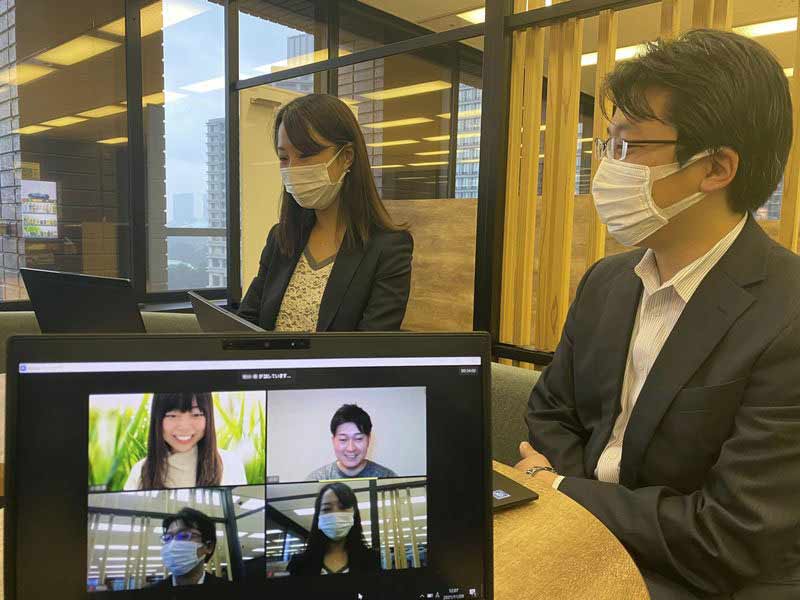
Employees of Tokio Marine Holdings, Inc. participate in a videoconference with teleworkers, seen on a screen, in Chiyoda Ward, Tokyo.
November 22, 2021
A survey conducted by The Yomiuri Shimbun on major companies’ views on telework revealed that the new style of work has begun to be reconsidered in response to the improvement in the COVID-19 pandemic situation. The survey results also showed the telework-related challenges of communication among employees and with business partners.
“We now have a new way of working that allows employees to choose where and when they work,” said Yuki Matsuo, the manager of the human resource department at Tokio Marine & Nichido Fire Insurance Co.
Since the outbreak of COVID-19, the insurer’s parent Tokio Marine Holdings, Inc. has set target rates of employees by department who are allowed to commute and work at the office, while many employees have worked from home.
As the spread of infections has subsided, employees of the company could choose whether to commute or telework. Since late October, the number of employees working at the company’s head office in Tokyo has increased. It has also become a common sight in the company for teleworkers to have videoconferences with employees who are in the office.
But employees of sales departments, who regularly meets customers and business partners, often feel inconvenienced, according to the company.
With the establishment of a new way for employees to voluntarily choose where and when they work, Tokio Marine plans to start a new system next spring that will allow employees to work without having to change their place of residence.
Reduce or expand?
According to the Yomiuri survey, just under 30% of companies said they would “reduce” teleworking.
When the coronavirus was spreading, the central government and local governments asked companies to reduce the percentage of employees who commute to work. But now that the number of infections is on the decline, some companies are cutting back on telework.
At Sumitomo Chemical Co., the average rate for telecommuting employees at its Tokyo headquarters in October was about 60%, down about 10 percentage points from the level during a state of emergency. A company spokesperson said the increase in the number of employees working in the office has the advantage of better communication.
Suntory Holdings Ltd., which will maintain its current teleworking policies, also said that, while making effective use of teleworking, the company will also “practice a work style that values the workplace.”
Five respondents said they would expand teleworking.
Nippon Telegraph and Telephone East Corp. (NTT East) is one of the NTT Group companies that has announced a policy of gradually reducing the number of employees transferred to other areas or married employees living away from their family as a result of a transfer.
“Remote work will be our basic style,” said an NTT East official. “We will change our style to be time and location agnostic.”
Meetings over meals
Nearly 60% of responding companies, or 73 of them, said they would relax their rules on meetings over meals.
Many companies have begun to allow such meetings, previously prohibited in principle, as restrictions on the operation of restaurants and bars had been lifted by late October.
Mitsubishi Estate Co. is one such company that eased rules on meetings over meals.
“They contribute to the revitalization of communication with colleagues and people outside the company,” the company said.
However, the company advises its employees to keep a certain distance from each other and avoid restaurants and bars where the risk of infection is considered to be high.
Osaka Gas Co. said that participant numbers should be as small as possible, with due consideration given to the necessity of any meeting over a meal.
Another company requires a negative PCR test result for employees to join meetings at restaurants, regardless of their vaccination status.
Outlook for recovery
Asked when business performance would return to pre-pandemic levels, 26 respondents said they have already recovered. Many of these are manufacturing companies making automobiles, petrochemicals and steel, whose exports have increased.
“Thanks to the recovery in automobiles and other production, our performance as a material manufacturer has returned to the level before the coronavirus pandemic,” Mitsubishi Chemical Holdings Corp. said.
Most of the companies that answered “unknown” or “after 2023” to the same question were in sectors such as the restaurant and transportation industries. Some predict that the impact of the pandemic will be prolonged, with East Japan Railway Co. (JR East) saying it does not expect passenger traffic to return to pre-pandemic levels due to changes in people’s way of life.
Top Articles in Business
-

Prudential Life Insurance Plans to Fully Compensate for Damages Caused by Fraudulent Actions Without Waiting for Third-Party Committee Review
-

Narita Airport, Startup in Japan Demonstrate Machine to Compress Clothes for Tourists to Prevent People from Abandoning Suitcases
-

Japan, U.S. Name 3 Inaugural Investment Projects; Reached Agreement After Considerable Difficulty
-

Toyota Motor Group Firm to Sell Clean Energy Greenhouses for Strawberries
-

SoftBank Launches AI Service for Call Centers That Converts Harsh Customer Voices into Softer Voices
JN ACCESS RANKING
-

Japan PM Takaichi’s Cabinet Resigns en Masse
-

Japan Institute to Use Domestic Commercial Optical Lattice Clock to Set Japan Standard Time
-

Israeli Ambassador to Japan Speaks about Japan’s Role in the Reconstruction of Gaza
-

Man Infected with Measles Reportedly Dined at Restaurant in Tokyo Station
-

Videos Plagiarized, Reposted with False Subtitles Claiming ‘Ryukyu Belongs to China’; Anti-China False Information Also Posted in Japan




















